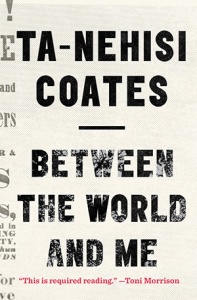On Jul y 3 of this year, “dream” held an array of rich connotations for me. From open imagination to the urgent longing toward social justice, the word was evocative, engaging, comfortably owned. On July 4, I read the excerpt in the Atlantic of Between the World and Me by Ta-Nehisi Coates, and through his beautiful eyes and his nuanced, authentic voice, my definition expanded and opened a wealth of questions still resonating five months later, leading to discussions of it among faculty, staff, and students, and writing my own ongoing, probing reflection. Coates tilted my world and left me swooning on the floor.
y 3 of this year, “dream” held an array of rich connotations for me. From open imagination to the urgent longing toward social justice, the word was evocative, engaging, comfortably owned. On July 4, I read the excerpt in the Atlantic of Between the World and Me by Ta-Nehisi Coates, and through his beautiful eyes and his nuanced, authentic voice, my definition expanded and opened a wealth of questions still resonating five months later, leading to discussions of it among faculty, staff, and students, and writing my own ongoing, probing reflection. Coates tilted my world and left me swooning on the floor.
How can one day and one book make such a difference? The answer, I discover, may lie in four R’s: Reading, Writing, Reflecting, and Relating.
Reading. I read reflectively, making personal meaning as I read. I have so long practiced this approach that it is a habit more deeply ingrained than its predecessor—reading analytically, in my head, as though my logical mind existed independent of spirit and body—in a state of perpetual disambiguating logic. Reading Coates was a revelation to me, a maelstrom of personal meaning-making, and engagement.
Writing. In an interview with The Root, Coates says that he writes for a black audience, refusing to dumb down or cut anything back for white readers. Whether he is writing about the case for reparations or the many ways we as Americans dream through our reflections on race and justice, he exudes deep understanding of the lived black experience in the U.S. I accept and celebrate the truth of this, though I am white. In half a century of unlearning my own forgetting, I find Coates extraordinarily helpful, writing with clarity, depth, and self-reflection.
Reflecting. The mirror Coates holds up startles and confounds me. It wakes me from my own forgetting. Reflection is like that, an opening, a candle-lit cave, revealing a room dim and an end in itself until a new opening looms.
Relating. I have spent decades understanding, reading, writing, and reflecting on these matters of race and class at this unfolding moment in the U.S. And yet, I remain blind, deaf, and dumb even to my own reality. I had grown smugly comfortable with my ignorance. Then Coates insists that we talk of racism and white supremacy rather than “privilege,” and he startles me into myself and reality anew.
To read Ta-Nehisi Coates’ Between the World and Me is to savor a nuanced, layered paradox that rhymes disturbingly with the complicated reality in which we live. The Dreamers, Coates’ metaphor for people who “believe they are white” and are living the good life, have forgotten the cost and have forgotten, in fact, that their dream is a luxury paid for by the suffering of others. The Dreamers, Coates asserts, are extraordinary engineers of their own forgetting, stopping America’s heart in the process. I am that Dreamer, deluded that I am that disembodied insight even as I reassure myself that I am wholly here now. And as I read, write, and rediscover the Dream, my own reality shifts. I breathe. Stretch. Feel my thighs press the chair, my feet press the soles, my eyes itch, and my gaze lift.
This embodiment gives me hope even as his message is so dire. For although his experience is dark, and he unflinchingly catalogues the vicious racism in our culture, I feel that Coates, too, is hopeful—able to tell the whole truth, to “…not cut anything back” and in many surprising ways to be deeply heard—necessary preconditions for hope.
CPR. The relentless clarity of Coates’ beautiful eyes, his steady, unflinching gaze, his loving, gentle arm around his son…and his reader, these insistent pulses call breath back to my body, back to where I wake on the cold ground. Rising like Lazarus, I gather my realizations like chicks, warmed and protected before they extend themselves and me, in chill morning air.
Just as Coates quotes Wright, I see that something was also thrust between the world and me. Dreams reveal new perspectives. The camera has a nauseating sweep as I re-orient, my head still wet with the morning dew.
__
John Alexander writes fiction and creative nonfiction, which has been published in a variety of journals. He is currently working on a book of reflective writing that explores such meaningful items as his totem animal, the tick, and his four-year-old fashion breakthrough of smearing his hair with tar.
